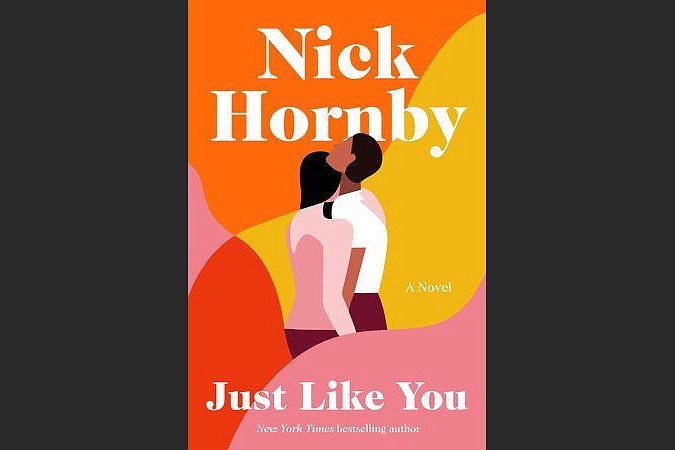It feels like we've passed through a portal. It's getting increasingly difficult to remember what life was like two or three normals ago. Can we still relate to these people in books and movies doing bizarre things like going to clubs and hugging strangers? Does fiction still have a place in a world that admits no nuance? Do we even still care about stories about likable people of modest accomplishment and agreeable natures?
Nick Hornby's ninth novel, "Just Like You" (Riverhead Books, $27) is no big deal. It's all sparkling dialogue, generous assumptions about human motives, warm and cozy as a crackling fireplace. It's purposefully human scale, a plausible love story about unlikely lovers (what lovers are ever likely?) muddling along in London in the weeks preceding and the months after the Brexit vote.
[RELATED: Philip Martin talks about books in On Books video]
Lucy is a woman a lot of us know — early 40s, white. professional, freshly separated on her way to divorce with two school-age boys. She would, of course, like to meet a man who "loved fresh flowers and the films of Asghar Farhadi ... preferred cities to the countryside" and read "proper fiction, not novels about terrorists and submarines," but she understands how rare such "solvent, funny, clever, liberal, stimulating" creatures are.
When her friend Emma — another type we quickly recognize, a married woman who suppresses her deep unhappiness by maintaining a constant patter of cringe-y sexual innuendo — asks her what's she's looking for in a man, she replies, "Hygiene."
Lucy's fine, actually. Things with Paul didn't work out because he's an addict, and while she can forgive him the harm he's done, she can't forget it. He's working on sobriety, he'll always be the father of her sons and part of her life, but never a major part of it again. She has her work as a school administrator, and friends who care enough to set her up on a blind date with a novelist who ticks not quite enough of the boxes. She's far better off than unfortunate. Neither Emma nor us should spend time worrying about her.
But, in line at the butcher's, Emma points out a young counter worker, a Black man named Joseph (not "Joe") who is 22 years old and lives with his Bible-believing mother two or three Underground stops away from the fashionable London neighborhood where Lucy and Emma live and shop. Emma allows how she would love to eat him up. Lucy is embarrassed for her flirtatious friend but understands what she means.
Meanwhile, as Joseph is deftly deflecting Emma's comments, he notices her "hot friend." Lucy notices his noticing.
There is an immediate connection between them, something real but inchoate, that might be turned one way or the other. Lucy asks Joseph to babysit because she needs a babysitter — it's not a pretext for anything else. And Joseph accepts the gig knowing full well his fantasies are unlikely to be realized. But a man can dream.
Hornby is very good at constructing interior lives for these characters, at allowing us to ride along as they weigh the risks and benefits of embarking on an affair. Joseph is intelligent but unschooled — he's never read Shakespeare or even seen one of his plays. Lucy is self-consciously cultured; were she American, she'd carry around an NPR tote bag. She has certain expectations of the world, while Joseph has only recently started to consider the possibility of being happy.
"If you'd asked him before... what made him happy," Hornby writes, "he wouldn't really have understood the relevance of the question. Now he knew the answer: sleeping with Lucy, eating with Lucy, watching TV with Lucy. And maybe there was no future in it, but there was a present, and that's what life consists of."
Ah yes, the everlasting Now, where we all should live always. Except that as the prophet Steve Miller put it, time keeps on slippin' into the future. And there's no future. What's Joseph going to do, introduce Lucy to his mother?
Though the age thing is more of a problem than the race thing, there's still the race thing. A neighbor sees Joseph knocking on Lucy's door one night and calls the police. Lucy thinks it's a big deal; Joseph knows it can't be.
But more than the race thing is the class thing. Joseph is level-headed enough to understand his music is probably not going to go anywhere; he's better off sticking with coaching football (soccer).
Lucy doesn't know anyone who voted for Brexit, she doesn't know anyone who bought their house for a single pound note. But Joseph's dad thought he'd get more work as a scaffolder if they kicked the immigrants out. Caught between two worlds, Joseph does the only sensible thing — making two Xs on his ballot. To stay and to go.
A lot of people will find "Just Like You" an underwhelming and unambitious book because it's just a love story about two vulnerable, viable people from different backgrounds who find comfort in each other. But there are others who might insist that's not just the most important story — it's the only story that matters.
pmartin@adgnewsroom.com | www.blooddirtangels.com
